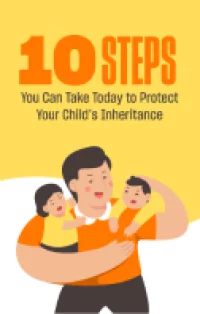
10 Steps You Can Take Today to Protect Your Child’s Inheritance
This guide will help you protect your child’s inheritance, so you can prevent future unintentional missteps.

According to a 2023 survey by Caring.com, only 34 percent of Americans have a last will and testament, despite 64 percent agreeing that it is important to have one. No matter how young or old you are, there is no better time than today to start estate planning. A will provides peace of mind that even if the worst happens, you have done what you can to care for your loved ones.
Similarly, a living will outlines your wishes for your medical decisions when you can no longer make them, saving your family from making difficult choices on your behalf. Learn about estate planning in Virginia, what a will and a living will can do for you and your family, and how the Virginia trusts and estates lawyers at Melone Hatley, P.C. can help.
What is a Will?
A last will and testament is a legal document that gives you the power to decide how your assets are distributed once you are gone. A will designates the beneficiaries of your personal property and assigns an executor to take care of final estate plans and costs. Any adult over 18 and of sound mind can make a will in Virginia. Under Virginia state law, a will must be signed in front of two witnesses, who must also sign in front of you.
The Role of a Will in Virginia Estate Planning
A will can be used to create a trust or convert a revocable living trust to an irrevocable trust. However, using your will to create a trust upon your death will not protect your assets from first going through probate.
Having a will speeds up the process of probate and allows your beneficiaries to receive their inheritances faster and with less stress than going through the full probate process without a will. Having a will can make all the difference in seeing your last wishes carried out regarding your money, real estate, business, heirlooms, and even care for your minor children.
By creating a will, you can leave assets to your loved ones, even if they are not relatives. You can also designate an executor to carry out the fiduciary responsibilities of estate administration. An executor is responsible for paying final estate taxes, expenses, and debts and distributing the decedent’s estate according to their wishes.
A will is even more important if you have special needs or minor children because it allows you to specify a legal guardian and caregiver. This is particularly important if you are a single parent. If you do not name a guardian for your children in your will, the court will decide who gains guardianship and conservatorship of your children if both parents die. For families with minor children, a revocable trust can eliminate many of the requirements, fees, and stress of probate during a difficult time. It allows you to designate a trustee who can control the inheritance of your minor children until they reach a designated age.
Virginia Wills
Lawyer Near Me
Consequences of Dying Without a Will in Virginia
Dying without a will in Virginia means you die “intestate,” and state laws, not your wishes, will determine how your estate will be distributed after your death. Intestate succession in Virginia follows the following rules:
- If you are married without children or other descendants, your surviving spouse inherits your entire estate.
- If you have children (or other descendants) and no spouse, your descendants will inherit your entire estate.
- If you are married with children with your spouse, your surviving spouse inherits your entire estate.
- If you are married and have at least one child from a previous relationship, one-third of your estate is inherited by your surviving spouse, and the rest is divided among your descendants.
- If you have no spouse or children but you are survived by one or both of your parents, they will inherit your estate.
- If you have no spouse, descendants, or living parents, your siblings will inherit your estate.
- If you have no spouse, descendants, living parents, or siblings, other family members can inherit your estate.
- Unfortunately, in the event you have no surviving family, your estate will go to the Commonwealth of Virginia.
Without a will, you don’t have the ability to designate who benefits from your estate and in what proportions. Furthermore, the probate process can be far more time-consuming and costly to administer the estate without the direction of a will.
If you die without a will, the court may also have to decide who will care for your minor children. If you are married or your children’s other parent is still alive, your spouse or former spouse will care for your children. But if there is no surviving parent, the court must appoint a guardian. This may not align with your preferences and present the potential for family disputes.

Contesting a Will in Virginia
In Virginia, a will can be contested by an interested party. This can be an heir, someone who would be an heir if the decedent passed without leaving a will, or a beneficiary from an earlier version of the will after it has changed. However, you must have precise reasons to contest a will. These include:
- Undue influence: Someone exerted pressure or influence on the decedent while drafting the will.
- Incapacity at the time of signing: The decedent was not in their right mind when they signed their will.
- Fraud: The will is false or was created under false pretenses.
- Noncompliance with state laws: Something about the will is out of compliance with the law, such as if there were no witnesses or the document was improperly filed.
There is a time limit to contest a will. This statute of limitations is one year from the date probated or filed in the office of the clerk of the court.
Tips to Avoid a Will Contest
Hire an Attorney
An attorney can help with clear wording compliant with state laws. This can help to avoid a will contest for noncompliance or fraud.
Choose Disinterested Witnesses
Choosing the right witnesses with no interest in the distribution of assets can help in several ways. It can avoid accusations of undue influence, misconduct, or fraud. While it is not required to use a disinterested witness, it’s best not to use a beneficiary as a witness. A notary is not required, but it helps prove the validity of a will without requiring the witnesses to appear and testify regarding execution of the will.
Obtain a Competency Evaluation
To avoid accusations of incapacity, always have a doctor evaluate your competency at the time of signing and filing your will. You can then keep this doctor’s evaluation with the will so that there is no question about your mental capacity when you signed.
Write a Letter of Intent
If you intend to leave anyone out of your will or give them a reduced share, always write a letter of intent that clearly states what you want and why. You can keep this letter with your will. It will then act as a further explanation against any challenges.
Include a No-Contest Clause
A no-contest clause simply states that if anyone contests the will and loses, they inherit nothing. This can be a powerful deterrent to anyone trying to get more than their due share.
How is a Living Will Different From a Will?
Living wills, also known as advance medical directives in Virginia, are legal guidelines that specify your preferences for medical care and decisions if you become incapacitated or too ill to care for yourself.
An advance healthcare directive allows you to create specific instructions for your care in the event that you are unable to do so. These guidelines enable you to:
- Demand that a certain procedure or treatment be provided or withheld
- Designate a person to make medical decisions on your behalf, including the choice to donate all or specific parts of your body through organ or tissue donation

The Importance of a Living Will
A living will permits you to allow or deny certain medical options, even if the decision will result in death. This document can be used to decline a treatment that will only postpone the moment of death, not prevent it, since the will takes effect in situations of terminal injury or illness.
By creating these documents while you are still capable, you will help family members or caregivers make the decisions you need in times of emergency.
We Can Help You Plan For Your Future
At Melone Hatley, our law firm has dealt with all manner of estate planning issues, including inheritance tax law, probate, wills, living wills, various types of trusts, powers of attorney, and beyond. We serve clients all over Virginia, including Charlottesville, Fairfax, Richmond, and the seven cities of the Hampton Roads region. We also have a offices in Columbia, South Carolina and Tampa, Florida. We care about you and are ready to help you with your legal issues.
No matter your age or circumstances, everyone deserves the peace of mind that their loved ones will be cared for into the future. Whether your planning needs are simple or complex, let Melone Hatley help you accomplish your goals and provide legal services that work for you. Our Virginia estate planning attorneys can help you with every step of the process.

 (757) 296-0580
(757) 296-0580






















